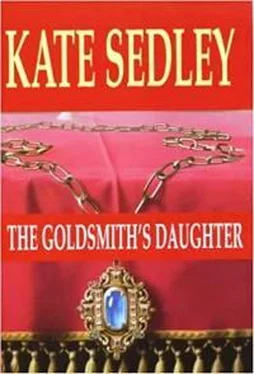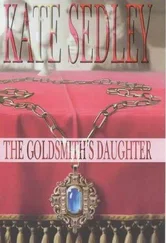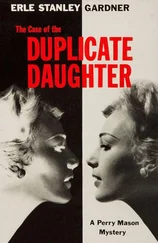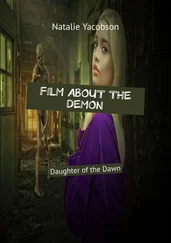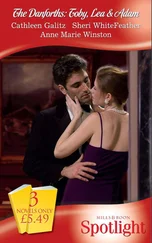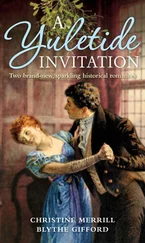Two weeks after her twenty-fourth birthday, she had finally married. Her husband, Gideon Bonifant, was ten years older than his bride and of inferior status, having been no more than assistant to an apothecary in Bucklersbury before the wedding. But Miles Babcary had been so relieved to see his only child settled and happy at last that he had, as well as welcoming Gideon into his home, also taken him on as a partner, patiently teaching his new son-in-law the business of goldsmithing from the lowliest task to the most complex. Master Bonifant had proved himself to be an apt pupil and the business throve, the one sadness being that after five years of marriage there was no sign of a grandchild for Miles; no immediate heir after Isolda to inherit his shop and his money.
The Babcary household, as well as an apprentice and maid-of-all-work, also consisted of Miles’s niece and nephew, his younger brother Edward’s orphaned children. Edward Babcary had died at the battle of Tewkesbury fighting for King Edward in the spring of 1471, and his wife had died of plague two months later. At that time, Christopher Babcary had been thirteen years of age, his sister only eleven, and with typical generosity, Miles had offered them the shelter of his roof. His nephew he had taken on as a pupil in the shop, while Eleanor Babcary had proved a useful assistant to Isolda in the running of the house. Even after Isolda’s marriage the following year, no serious changes were deemed to be necessary, and the domestic and business arrangements of the Babcary household had carried on in much the same way as before, except that with both his son-in-law and his nephew learning the trade, Miles had needed only one apprentice.
And so matters had continued for the next five years, until the autumn of 1477.
‘I have to admit,’ Mistress Shore said, her colour slightly heightened, ‘that although I used to be a frequent guest of my father’s cousin and his daughter, I have lost touch with them of late, for the past three years in fact, since … since I came to live here, in this house,’ she finished.
I nodded understandingly: she had had less to do with the Babcarys since becoming the King’s mistress. But she was not a woman who would ever consider herself of so elevated a status that she would ignore her kinsfolk completely. Some contact had been maintained with the family, and when Isolda Bonifant had been suspected of murdering her husband, Mistress Shore had brought all her considerable influence to bear upon the King in order to ensure that no charge was brought against her cousin.
‘For I didn’t, and still don’t, believe Isolda guilty of such a crime,’ she said belligerently, jutting her chin and daring me to question her judgement. ‘There has to be another explanation, and if people weren’t so bigoted, they’d see that for themselves. Friends and neighbours who’ve known her all her life must know that she isn’t capable of killing anyone. It isn’t in her nature.’
Such blind faith made me uneasy. ‘How did Master Bonifant die?’ I asked.
‘He was poisoned.’ Mistress Shore sounded defiant, as well she might. ‘Oh, I know what you’re thinking! That poison is a woman’s weapon.’
‘It’s easier for them to use than either the dagger or the cudgel,’ I pointed out. ‘On the other hand, I’ve known women who have resorted to both those methods, and men who have administered poison. They say it’s a favourite means of despatching enemies in Italy. Do you know what poison was used?’
Mistress Shore hesitated. ‘I think it was aconite, monkshood, or so Miles Babcary informed me. I’m not sure how he knew. I suppose the physician or the apothecary who was called recognised certain symptoms.’
‘Undoubtedly. I believe it causes burning pains in throat and stomach, and the victim has great difficulty in swallowing. The muscles of the neck stiffen, and after ten minutes or so, breathing becomes impossible.’
Jane Shore gave a little shiver. ‘How horrible! But there were other people in the house as well as Isolda. It might have been one of them. I believe that Christopher Babcary didn’t get on well with Master Bonifant. They had had many disagreements.’
‘Do you know why?’
My hostess did not reply at once, looking down at her hands, clasped in her lap. Finally, after a few moment’s silence, during which the only sounds to be heard were the old dog’s wheezy snores and the crackling of the fire on the hearth, she raised her head and looked me in the eyes.
‘Master Chapman, I must be honest with you. The King doesn’t wish me to be too closely concerned in this business. Until my kinswoman’s name is cleared, he prefers that I have nothing to do with the Babcary household.’ She sighed. ‘I can understand that. He feels that he has done enough by bringing his influence to bear and preventing charges being brought against Isolda. Therefore, if I give you my cousin’s direction in West Cheap, you would earn my deepest gratitude if … if–’
‘If I were to confine all my enquiries to the family, and not bother you until I have reached a conclusion,’ I finished for her.
She smiled mistily at me. ‘Indeed, I feel ashamed of making this condition, but I cannot bring myself, at this difficult time, to go against His Highness’s wishes.’
‘And how will the Babcarys like me poking and prying about? Do they even know of my existence?’
‘Yes. Yes, they do, and all of them are anxious for your assistance. They want to know the truth as much as I do.’
It occurred to me that there must be one person who already knew the truth and whose welcome would be a sham: the murderer. But I said nothing. Instead, I rose, kissed the little hand that was offered me and promised Mistress Shore that I would do everything in my power to discover who had really killed Gideon Bonifant.
I recognised the place at once. It was the house where Adela and I had seen the lazy apprentice being scolded from an upper window by his bespectacled master.
Following Mistress Shore’s directions, I had walked almost to the end of West Cheap, where, at the Church of Saint Michael at Corn, it joins Paternoster Row to the south and the Shambles to the north.
‘Look for a shop and dwelling close to the Church of Saint Vedast,’ she had instructed me. ‘A representation of two angels is painted on the plasterwork between the third-storey window and the roof. I sent to my cousin this morning to warn him of your arrival. You will be expected.’
So there I was, a pallid winter sun struggling to break through the leaden clouds, my cloak and boots splashed with mud and filth from carts driving too near the central gutter, my ears deafened by the babel of street cries – ‘Hot sheep’s feet!’ ‘Ribs of beef!’ ‘Clean rushes!’ ‘Pots and pans!’ ‘Pies and pasties!’ and dozens more. Every few yards of my journey from the Strand, hands had clutched at my sleeves and whining voices had assailed my ears, pleading for alms. Some beggars were hale and hearty, others hideously disfigured, either by nature or by the cruelties of civil punishment and war, and all excited pity. I gave what I could, but there were too many suppliants, and eventually I had been forced to ignore their importunities. I reached my journey’s end with some relief and entered the shop.
A long counter faced me as I stepped inside, and beyond this was the workroom. A youth, the same boy I had seen three evenings since, was working the bellows at a furnace built into a wall, while the same elderly man was admonishing him in an exasperated tone.
‘No, no, no, Toby! A light pressure, if you please! You want to fan the coals gently into flame, not blow great clouds of smoke out through the vent to choke the passers-by! Good God, lad, don’t you ever attend to any of the instructions that you’re given?’
Читать дальше
